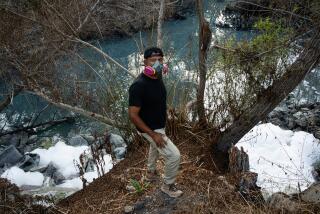Waste Laws Studied by Health Officials
State and county health officials are taking steps that could lead to tightened regulation of infectious medical wastes--including those produced by small clinics and doctors’ offices--as authorities investigate how blood samples, used syringes and bandages have washed ashore on the state’s beaches and surfaced in its landfills.
The state Department of Health Services has put together a task force to study the spectrum of problems associated with the production, handling and disposal of infectious medical wastes, including the exemptions now afforded so-called low-level waste producers.
In Orange County, where wastes littered the coast from San Clemente to Seal Beach during the week, officials of the county’s Environmental Health Waste Management Section were attempting to determine what protections are offered under current laws.
“We’re reviewing the laws and regulations to make sure protection is adequate,” said John J. Hills, environmental health program manager.
The Los Angeles County Department of Health Services also has been ordered to determine if the county should do what the state does not: subject all producers of infectious wastes to the same standard of conduct. The San Diego County Board of Supervisors took a first step in that direction last week.
“The whole issue of infectious waste is out of hand,” said Ralph Lopez of the environmental health section of the Los Angeles County Health Department. “What the state (task force) is hopefully going to do is zero in on . . . the gaps.”
Dispute With Military
One of the gaps, one state official said, is a longstanding dispute over the state’s authority to enforce waste disposal regulations on federal military installations.
The issue was highlighted earlier this week when health officials in San Diego and Orange counties linked to the military both medical wastes and unopened vials containing antiseptics that had washed ashore in their jurisdictions. The officials have not yet pinpointed the specific source.
Navy officials have denied responsibility for any of the medical waste that washed up on San Diego County beaches. Navy spokesmen have said the chemical-biological warfare antiseptics that washed up on Orange County shores probably are military issue, but they have insisted that there is no proof the discarded chemicals came from a Navy ship.
Despite the recent incidents, several officials said they believe that California handles its medical wastes with more care than most states.
“I believe the system we have in place right now is woking pretty well. I think the incidents of illegal dumping like this are relatively few and far between,” said Bob Borzelleri of the state Department of Health Services.
‘Shoddy Handlers’
“I think (the illegal dumping) basically represents people who are shoddy handlers who are going to be shoddy no matter what your regulatory approach.”
Borzelleri said California’s problems are nowhere near as serious as those that last summer haunted East Coast beaches, where scores of syringes, blood samples and other potentially dangerous medical debris washed ashore.
California law requires that all producers of infectious wastes take specific precautions in the handling and disposal of needles and other sharp objects, human body parts and so-called etiologic agents--viruses or microorganisms capable of entering and harming the body. Violations can result in felony prison terms and tens of thousands of dollars in fines.
However, doctors’ offices, small clinics and other unlicensed health facilities that produce less than 220 pounds of potentially infectious waste each month are exempted from a host of other requirements governing everything from sterilization, incineration and burial procedures to the minimum strength of plastic disposal bags.
The San Diego County Board of Supervisors on Nov. 9 directed county attorneys to develop an emergency ordinance that would lift that exemption in all unincorporated areas of the county.
Problem With Exemption
Hills, of Orange County’s environmental health division, said that the state-law exemption causes problems but that a county ordinance is not a good solution.
“If we got a county ordinance, it would only cover the territory where cities don’t exist, and in our county, most of the population is in the cities,” he said.
“There is definitely a problem caused by disposal of medical waste from some doctors’ offices and clinics. From time to time we find bloody bandages and swabs and things like that lying in the streets near dumpsters. What happens is that people going through refuse, looking for things, pull out the medical refuse and leave them lying around.”
In addition to the medical wastes that have washed up on San Diego County beaches in the last 3 weeks, workers at the San Marcos landfill in San Diego County on Oct. 27 discovered as many as 14 red plastic bags containing human tissue and surgical instruments that had been improperly transported and buried at the dump. Both tissues and surgical instruments are classified as potentially infectious.
State law requires that such infectious materials be properly processed, placed in plastic bags and then sealed in leakproof containers before the containers are buried.
In Los Angeles County, health officials are studying a plan that would impose similar responsibilities on low-level producers of infectious medical wastes.
And San Diego County Supervisor Susan Golding has suggested legislation that would lift the exemption for low-level producers statewide.
More to Read
Sign up for Essential California
The most important California stories and recommendations in your inbox every morning.
You may occasionally receive promotional content from the Los Angeles Times.










